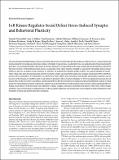I kappa B Kinase Regulates Social Defeat Stress-Induced Synaptic and Behavioral Plasticity
Author(s)
Christoffel, Daniel J.; Golden, Sam A.; Dumitriu, Dani; Robison, Alfred J.; Janssen, William G.; Ahn, H. Francisca; Krishnan, Vaishnav; Reyes, Cindy M.; Han, Ming-Hu; Ables, Jessica L.; Eisch, Amelia J.; Dietz, David M.; Ferguson, Deveroux; Neve, Rachael L.; Greengard, Paul; Kim, Yong; Morrison, John H.; Russo, Scott J.; ... Show more Show less
DownloadChristoffel-2011-I kappa B Kinase Regulates Social Defeat Stress-Induced Synaptic and Behavioral Plasticity.pdf (1.554Mb)
PUBLISHER_POLICY
Publisher Policy
Article is made available in accordance with the publisher's policy and may be subject to US copyright law. Please refer to the publisher's site for terms of use.
Alternative title
IkB Kinase Regulates Social Defeat Stress-Induced Synaptic and Behavioral Plasticity
Terms of use
Metadata
Show full item recordAbstract
The neurobiological underpinnings of mood and anxiety disorders have been linked to the nucleus accumbens (NAc), a region important in processing the rewarding and emotional salience of stimuli. Using chronic social defeat stress, an animal model of mood and anxiety disorders, we investigated whether alterations in synaptic plasticity are responsible for the long-lasting behavioral symptoms induced by this form of stress. We hypothesized that chronic social defeat stress alters synaptic strength or connectivity of medium spiny neurons (MSNs) in the NAc to induce social avoidance. To test this, we analyzed the synaptic profile of MSNs via confocal imaging of Lucifer-yellow-filled cells, ultrastructural analysis of the postsynaptic density, and electrophysiological recordings of miniature EPSCs (mEPSCs) in mice after social defeat. We found that NAc MSNs have more stubby spine structures with smaller postsynaptic densities and an increase in the frequency of mEPSCs after social defeat. In parallel to these structural changes, we observed significant increases in IκB kinase (IKK) in the NAc after social defeat, a molecular pathway that has been shown to regulate neuronal morphology. Indeed, we find using viral-mediated gene transfer of dominant-negative and constitutively active IKK mutants that activation of IKK signaling pathways during social defeat is both necessary and sufficient to induce synaptic alterations and behavioral effects of the stress. These studies establish a causal role for IKK in regulating stress-induced adaptive plasticity and may present a novel target for drug development in the treatment of mood and anxiety disorders in humans.
Date issued
2011-01Department
Massachusetts Institute of Technology. Department of Brain and Cognitive SciencesJournal
Journal of Neuroscience
Publisher
Society for Neuroscience
Citation
Christoffel, Daniel J. et al. “I kappa B Kinase Regulates Social Defeat Stress-Induced Synaptic and Behavioral Plasticity.” The Journal of Neuroscience 31.1 (2011) : 314 -321.
Version: Final published version
ISSN
0270-6474